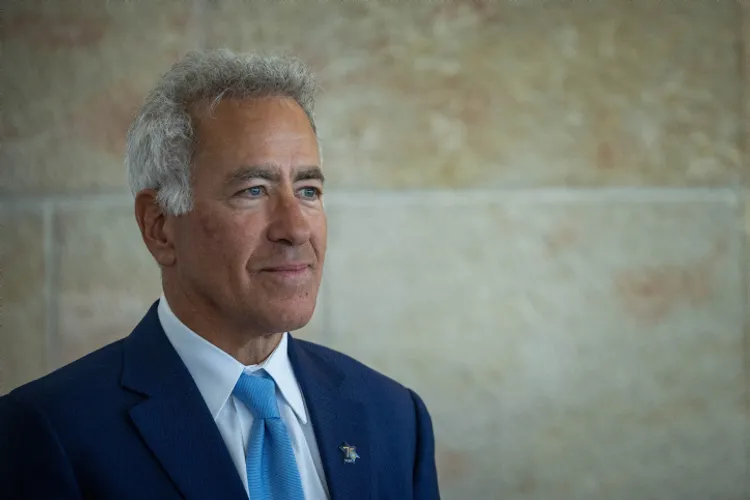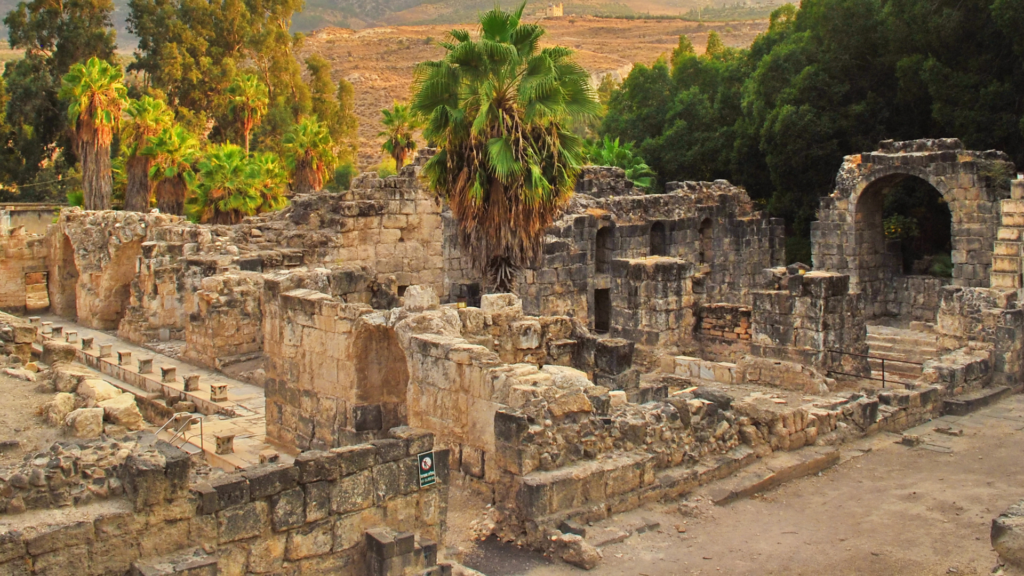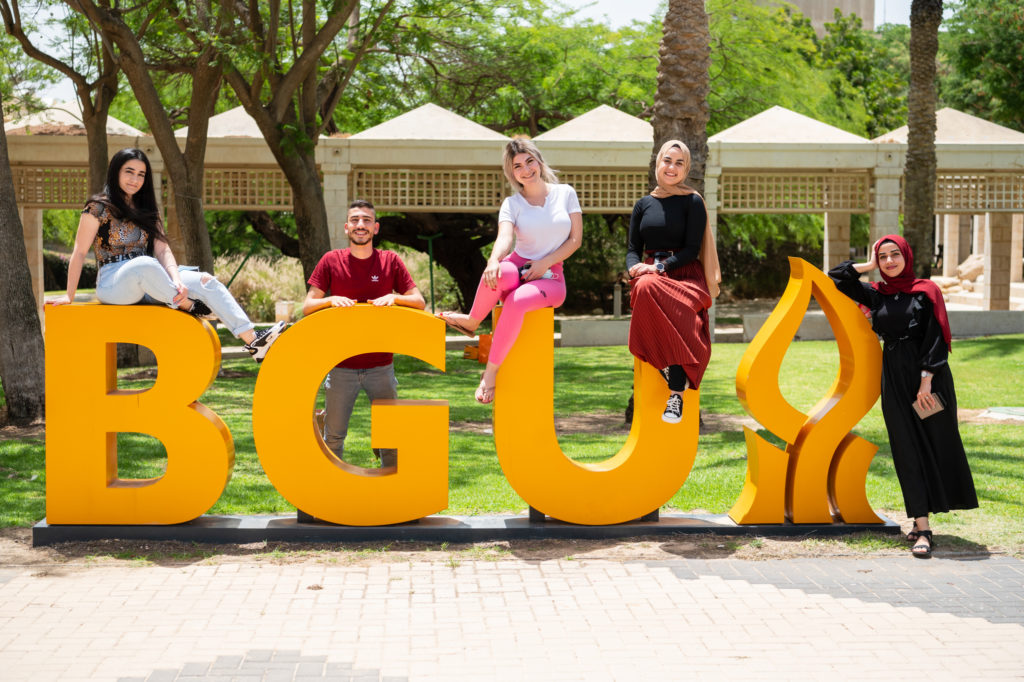
Sowing the Seeds
February 8, 2010
 On a chilly desert evening, sixty-odd students squeezed into a lecture room to listen to a presentation convened by Mercaz Africa, The Africa Center at Ben-Gurion University of the Negev. The presenters were not academics or “experts” on Africa, but rather young adults like the students themselves.
On a chilly desert evening, sixty-odd students squeezed into a lecture room to listen to a presentation convened by Mercaz Africa, The Africa Center at Ben-Gurion University of the Negev. The presenters were not academics or “experts” on Africa, but rather young adults like the students themselves.
A few months earlier, they had completed a three-month stint volunteering in West Africa, undertaking community service and developing a first-hand, acute awareness of the challenges faced by many of Africa’s citizens.
But the trip was as much about learning as it was about working: appreciating the ingenuity and improvisation that life in rural Africa demands, and enjoying the richness of the continent’s culture, art and music.
The audience – all prospective volunteers for the next delegation – were enthused by the descriptions of their presenters’ experiences, if a little bemused by accounts of the practical difficulties encountered by the volunteers along the way.
After listening to some of the deprivations faced by the delegation during their trips to Ghana and Cote d’Ivoire – erratic electrical and water supplies, language barriers, mosquitoes, homesickness – a student raises his hand to ask a question: “So, what exactly did you do for food?”
Hila, the speaker, who spent her three months in the rural interior of Cote d’Ivoire, smiles wanly.
“Mainly pasta and rice,” she replies. “Easy to cook, hygienic…”
Her questioner grins. “Ah, so just like student life in the university, then.” Everyone laughs.
Given Africa’s increased global profile over the last decade, it seems only logical for there to be an upsurge in interest in, and awareness about, the continent.
The traditional narrative of war, blight, poverty and disease has began to erode, replaced with an appreciation of a more nuanced, if at the same time complicated reality; one that reflects not just the weaknesses and difficulties, but also the strengths and untapped potential of Africa.
The abundance of natural resources across the continent has, unsurprisingly, elevated its strategic importance, as demonstrated by China’s extensive commercial forays across the continent.
The potential for mutually beneficial bilateral trade has become impossible to ignore, a fact tacitly acknowledged by the government. Last autumn, Foreign Minister Avigdor Lieberman visited five African countries, clearly a step toward re-establishing a diplomatic presence on the continent that has been on the wane since the aftermath of the Yom Kippur War in 1973.
Viewed from this perspective, it might seem surprising that the status of African Studies as an academic discipline has been steadily downgraded in recent years, with universities cutting the previously noted departments and canceling academic programs altogether.
Economic pressures, exacerbated by the challenging financial environment, may partially explain this state of affairs; still, it is hard not to say that a lack of foresight is not also to blame.
But one university where this trend has not only been arrested, but reversed, is Ben-Gurion University, and largely thanks to the energy and enthusiasm of one person: Professor Tamar Golan.
Golan, a noted journalist, spent most of her professional career writing about Africa. After getting her doctorate at New York’s Columbia University, she covered African affairs for the Hebrew-language and international press for two decades, writing three books about the relationship between the continent and the West.
The seminal Shahor Lavan, Lavan Shahor (Black White, White Black), published in 1986, explored the complexities of Africa’s post-colonial history, informed by Golan’s personal knowledge of some of the continent’s leading advocates and fighters for independence.
Most recently, she wrote Angolan Rendezvous: Man and Nature in the Shadow of War – an overview of the impact of the country’s long and painful civil war on both its citizens and its rich natural environment, written in collaboration with zoologist Dr. Tamar Ron, and published by Am Oved in 2006.
An English edition is forthcoming from South African publishing house 30 Degrees South.
Professor Golan was appointed Israel’s first ambassador to Angola in 1994. When her tour of duty ended in 2002, she returned to her home at Kibbutz Lahav, although she did return to Angola – a guest of the government – to head a task force to deal with the challenge of decommissioning minefields, a lethal reminder of the conflict that had torn the country apart.
She subsequently took up a teaching position at Ben-Gurion University.
Recognizing both a gap and an opportunity in her area of expertise, she secured the university’s encouragement – and, perhaps more significantly, generous financial support from two donors, Baron Erich de Rothschild of France and Israeli entrepreneur Eytan Stibbe – to set up in 2006 what was then known as the Africa Initiative.
“Our primary objective was to draw students to a not very well known area; to engage them, to nurture their interest in the history and culture of the continent,” Dr. Golan explains, noting that the initiative was very fortunate in securing sponsorship that allows it to maintain its independence.
“No strings attached, extremely generous. We deliberately do not seek to raise funds elsewhere because all too often it comes with conditions. This way, we can set and control our own agenda.”
 At the time, the university offered individual undergraduate courses in African history, politics and literature, and it was obvious that the selection – offering, collectively, a multi-faceted critique of the continent’s colonial history and post-independence development – was hugely popular with the student body.
At the time, the university offered individual undergraduate courses in African history, politics and literature, and it was obvious that the selection – offering, collectively, a multi-faceted critique of the continent’s colonial history and post-independence development – was hugely popular with the student body.
Encouraged by the success, the university decided to establish a full-fledged African Studies Division within the Department of Politics and Government, offering courses to students in the Faculty of Humanities and Social Sciences, as well as to students from the Faculty of Health Sciences and Medicine.
At the same time, it committed to expanding its involvement with, and support of, social-voluntary activities connected to Africa studies in general.
“I genuinely believe that what the university is doing here is something quite innovative, very different, by actively involving the student body in the running of the Africa Center,” Prof. Golan says.
I am a guest at her home at Kibbutz Lahav, small and modest but elegantly appointed with art works and artifacts accumulated over the course of her long career traversing Africa. She shows me an intricately carved wooden stool, hewn from Mahogany wood and burnished to a fine sheen.
“A gift from the last delegation to Cote d’Ivoire,” she explains.
Prof. Golan had invited me to her home, not to interview her – “enough has been written about me already, thank you very much” – but to meet with the student committee involved in planning the next volunteer delegation, scheduled to spend three months in Sierra Leone in West Africa later this year.
“I want you to meet the young people who actually make it happen,” she says. “Whenever people say that this generation has no commitment to changing anything, I always wish that they could come and meet my friends here. They are the perfect argument against this nonsense.”
Since 2007, the Student Association of Ben-Gurion University – through its Africa Volunteer program – has coordinated volunteer programs to the continent, with financial and organizational support of the university channeled through the Africa Initiative.
Thus far, delegations have spent three-month stints in Tanzania, Angola – where they helped construct an agricultural village for discharged soldiers of the rebel “UNITA” movement – Cote d’Ivoire and Ghana.
In the latter two countries, visited last year, the volunteers served in remote villages in the interior, working in schools and with local communities. They conducted educational activities focused on computer literacy, environmental awareness and public health, with an emphasis on AIDS awareness and prevention.
Uri Keidar, head of the Student Involvement department of the Student Association, explains that the aim of the volunteer program is not to create a narrow orthodoxy of student activism, but rather to encourage students to evolve their own critical appreciation of contemporary issues.
“It is not our place to tell students what to think,” he says. “What we hope for is to encourage them to act of their own initiative, to engage with issues in a meaningful manner.”
He says that the Africa Initiative has served as a remarkably effective conduit for the volunteer program, a reflection of the popularity of the courses and of the lecturers.
“The initiative exudes an energy, a passion that attracts students,” Avi Cohen, the Student Association’s International Relations Coordinator, concurs.
“I don’t know whether it is because of the university’s location in the south of the country, but students here challenge commonly held perceptions about young people. As a whole, the student body is socially active and committed, and the Africa Initiative helps to channel this passion.”
Golan, for her part, reiterates her opinion that it is the students who have made both the academic program and the volunteer scheme a success. But she goes on to observe that – given the demographic makeup of the university – it is only logical for the university to seek to devise ways to work collaboratively with the student community.
“With the 18,000 students here forming a majority of the university community, it only makes sense. The starting point for a productive engagement must be for decisions and programs to be made and carried out in conjunction with students, rather than about them, and on them,” she says.
The Africa Volunteer scheme, while the most established and visible activity at the present time, is merely a part of the ambitious goals of the Africa Center, successor to the Africa Initiative and formally launched by the university last December.
An interdisciplinary body including the Faculties of Humanities, Health Sciences & Medicine, and the Institutes for Desert Research at Sde Boker, the Center’s primary objective is to extend and embed the university’s commitment to academic, social and cultural engagement with the African continent.
Goals include encouraging the expansion of options in African Studies, not just at BGU but at other universities across Israel; strengthening bilateral partnerships between the university and its counterparts across Africa, by inviting senior African lecturers to teach at BGU and organizing relevant conferences; involving the African diplomatic community in Israel, and the Center for International Cooperation at the Foreign Ministry in the activities of the center; and assisting in projects related to Africa across Israel.
Spread over two days, the inauguration of the center succeeded handsomely in encapsulating the scope and ambitions of its goals. A full program included a series of academic workshops and seminars on subjects as varied as Israeli developmental aid to African countries, public health challenges across the continent and the connection between sports and politics.
A full program included a series of academic workshops and seminars on subjects as varied as Israeli developmental aid to African countries, public health challenges across the continent and the connection between sports and politics.
A delegation of presidents from leading African universities – guests of the Foreign Ministry – were invited to the launch and took part in a number of events. They participating in a colloquium, and visited the university’s Medical School for International Health, and the Institutes for Desert Research, located at the Sde Boker campus.
Speaking on behalf of the delegation, Professor Lillian Tibatemwa-Ekirikubinza of Uganda’s Makerere University expressed the sincere hope that the center would “sow the seed of partnership and cooperation,” and that it would draw academics, activists and people genuinely interested in the continent in coming years.
A number of cultural workshops and performances were convened by the Students’ Association, including a performance by Ethiopian-Israeli theater troupe Netele, and a concert by Alpha Blondy, a stalwart of African Reggae, humanist and social rights campaigner, and a personal guest of Professor Golan.
The launch ended with a speech by the iconic soccer player and roving ambassador for Cameroon, Roger Milla, followed by an exhibition soccer match between a team made up of African players in the Israeli soccer league, and a team of students and players with the local club Hapoel Beersheba.
Amid all the goodwill, however, it is fair to ask some searching questions. One common complaint characterizing the relationship between Africa and the outside world is what at times appears to be an in-built asymmetry; the presumption of a meeting between unequals.
Might the center, for all its good intentions, run the risk of being accused of paternalism in its overtures?
Golan nods. “I think what one must remember is that we have the opportunity to learn as much from Africa as we can offer to the continent. We have never taken the relationship as anything other than that of a partnership, with much to be gained on both sides.”
This understanding applies as much to another criticism, that with much to do locally to fight against socio-economic exclusion and imbalance, the energies of the volunteers might be better appreciated closer to home.
“Even when one discounts the fact that there is extensive work going on in Israel – with volunteers from all over the world – what is important is that the delegations are in themselves a learning experience,” she says.
Judging from the evidence, it would be hard to disagree. Back at the presentation to prospective volunteers, the veterans talk candidly about the steep learning curve that they negotiated over the course of their volunteer work.
Although they went to West Africa with the declared intent of sharing their knowledge and expertise with the local communities, they learned a lot themselves; about resilience, resourcefulness, the imperative to improvise and make the best out of the limited resources at their disposal.
They learned valuable lessons about how the local communities construct their lives with a fraction of what people elsewhere in the world take for granted; they came back much wiser for the experience.
Afterwards, as the students cluster around the speakers to ask questions, I chat with Ayala Nissan, the secretary of the Africa Center. She comments on the enthusiasm of the prospective volunteers.
“What I think is really remarkable is the fact that even after the presentation, they are still engaged, excited, keen to participate,” she says.
While putting together the event, she had attempted to enlist all the veterans from the last two exhibitions to speak with new prospects, but came across an unexpected obstacle.
“Most of them are unavailable: They’ve gone back to Africa, either by themselves or to volunteer on other projects,” Nissan says. “Once drawn in, they never want to leave.”



